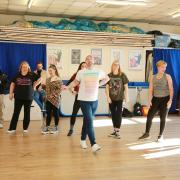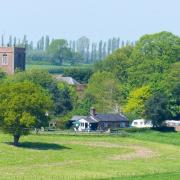Chester Racecourse was officially recognised in 2019 by the Guinness World Records, as the ‘world’s oldest racecourse still in operation’. This year the historic course is back to its winning ways. Here's everything you need to know to ensure an odds-on favourite day out

Our world-beating course
Chester's first recorded race was in the year 1539 – the namesake of the Roodee's award-winning fine dining restaurant that now overlooks the picturesque racecourse. In the near half-millennium racing has been taking place at Chester, the racecourse has seen an enormous amount of action.
Originally, the city of Chester was an ancient Roman hub and the racecourse was entirely underwater. It was used as a vitally important trading harbour for Roman vessels, and the anchor stones used by these vessels can still be seen on the racecourse today.

Over time and due to changes in the flow of water, the harbour slowly drained away leaving a meadow, which would later become the famed Chester Racecourse.
Across the hundreds of years of racing, there have only ever been three major halts to racing at Chester Racecourse – during the English Civil War, the First World War and the Second World War.

In 1946, after the Second World War had ended, the racecourse re-opened and was host to a record crowd of 103,993 people, demonstrating how much Chester Racecourses race days had been missed by its supporters.
The racecourse is consistently in the top five in the country for annual attendance with an average crowd at each race day being more than 25,000 attendees.

Chester Racecourse has also influenced a significant amount in horse-racing culture, including coining the term ‘gees-gees’ (a slang term for horses), which derives from the city of Chester’s mayor in the 16th century – Henry Gee.
The racecourse's May Festival races are its most famed, dating back hundreds of years. The May Festival is sponsored by renowned jewellers Boodles and has become an annual event attracting some of the biggest crowds and best horses, jockeys and trainers from both the UK and abroad.

Five ways to spend a day at Chester Races
Whether you’re a family on a budget, a group of friends enjoying a celebration, or a high-flyer with a helicopter and taste for the finer things, there is a race day for you.
1. At the beginning of the pricing structure, the Open Course is suited to young families who want to come and spend a day at the races, but on their own terms.
The large open course area at the centre of the track offers customers a wide-open space to set up with their own blankets or camping chairs and even to bring their own food and drink. Prices start from just £10 a person with children aged 17 and under, admitted free with ticket-holding adults.
2. The general admission enclosures such as Tattersalls and County Concourse offer guests a more traditional race day experience, with trackside viewing, bookmaker zones, a range of bars and food vendors and dress codes.
Tattersalls and County ticket-holders are entitled to cross the track throughout the day and enjoy the Paddock and Parade Ring at the centre of the racecourse. Tickets for Tattersalls start from £20 per person and County Concourse from £25. Children aged 17 and under are also admitted free of charge into these enclosures with ticket-holding adults.

3. For a premium and glamorous experience, the two enclosures – the Winning Post and Edinburgh Gin Garden – are a good bet. The Winning Post is a long-running fan favourite and guests are guaranteed a seat for the day. Situated in the Paddock at the heart of the racecourse, there are dedicated facilities including two bars and bookmakers, and partial cover from the elements.
The Winning Post is next to the finish line, giving guests of this enclosure a front-row seat to the winners of the day.
The Edinburgh Gin Garden (originally named the Champagne Garden), was new in 2021 and offers a luxurious setting for a day of racing. Dressed with floral arrangements and with cabanas, dedicated seating, bars, food service and bookmakers, this enclosure is also one of our most Instagrammable.
Both the Winning Post and Edinburgh Gin Garden are adults only, with the exception of Family Fun Day when the Winning Post allows children with tickets. These enclosures feature live music performances throughout the day on race days and often keep the party going after the last race.
Tickets for the Winning Post start from £65 per person, and the Edinburgh Gin Garden starts from £50 per person.
4. For those who are looking for a hospitality package, there is a breathtaking amount of choice. The White Horse gastropub at the centre of the racecourse, offers racegoers a table throughout the day, table service, a set menu included in the price and a free racecard.
The pub has a contemporary conservatory with a retractable roof, allowing diners to enjoy the British summer or shelter from wet weather.
Alternatively, Restaurant 1539 provides an award-winning fine-dining experience. Guests who are seated by the window in the glass-fronted restaurant, have a panoramic bird’s eye view of the day's action.
The Final Furlong is the place to be close to the action. Located in the Paddock, and part of the site's festival village, the Final Furlong is a white marquee with high ceilings and a private trackside lawn.
Prices for The White Horse start from £110 per person, Restaurant 1539 from £125 per person and the Final Furlong from £110 per person.
5. Launched in 2019, Parade hosts just 60 guests each race day, in an exclusive and intimate environment. On arrival at the racecourse, Parade ticket-holders are greeted by a dedicated team at a concierge desk at the gates and are taken across the track to the venue in the centre of the Paddock.
Here they are welcomed with a glass of Laurent-Perrier Rosé Champagne and shown to a table (seating two to eight people), with personalised racecards and a table-betting service.
A five-course, gourmet menu, prepared and cooked in-house is served during the afternoon and when racing finishes, guests can celebrate with a complimentary signature cocktail. A dedicated make-up artist is on hand.
The rooftop bar, with its plush seating, gives excellent views of the track. Visitors who want to skip the inner-city traffic can even land a helicopter at the racecourse. For Parade’s pricing, contact hospitality@chester-races.com.

2022 Racing Calendar
Wednesday, May 4 – City Day
The first race day of the entire season, and the first day of the historic and iconic Boodles May Festival.
Thursday, May 5 – Ladies' Day
The second day of the Boodles May Festival and the first of the season's two Ladies' Days at Chester.
Friday, May 6 – Chester Cup Day
The third and final day of the Boodles May Festival, and the most thrilling. The Chester Cup is a historic race, which is eagerly anticipated as the winner goes down in history. This day concludes the Boodles May Festival at Chester and is a triumphant celebration of the start of the season at the world’s oldest racecourse.
Saturday, May 28 – Roman Day
Roman Day is among the most popular fixtures at Chester Racecourse. Used to celebrate the racecourse's and city’s routes as a Roman hub, the meeting features collaborations with a number of local businesses, charities and organisations to bring a range of fun activities to racegoers, alongside the usual thrilling racing.
Saturday, June 11 – Summer Saturday
The first race day of summer. This June Saturday sees the city filled with eager racegoers ready to enjoy the warmer weather.
Friday, June 24 – Ladies' Evening
The first Friday fixture of the season is a landmark occasion. Friday evening fixtures take on an entirely different feel compared to their Saturday counterparts, with an energetic and electric atmosphere. These are fan-favourites with groups of friends who are looking for a chic night out.
Saturday, June 25 – Summer Festival
Following on from the thrills of the night before, Summer Festival sees racegoers return to the Roodee to enjoy a summer's day in the surroundings of the world’s oldest racecourse.
Friday, July 8 – Ladies & Gents Evening
This Friday night fixture encourages couples to hit the cosmopolitan city of Chester in their very best attire. The evening is a showcase of the latest styles and sees the racecourse transform into a hub of high society.
Saturday, July 9 – City Plate Day
One of the most popular race days at Chester Racecourse, especially with visitors from the Liverpool area, City Plate Day is known for turning Chester into an unrivalled hub of activity. Tickets sell out quickly.
Saturday, July 16 – Midsummer Meeting
This fixture marks the midway point of the season.
Sunday, July 31 – Family Fun Day
One of the busiest days of the racing season. Chester Racecourse’s Family Fun Day has been a yearly occurrence since 1995. While racing continues to take place, the racecourse reduces the prices of tickets including the luxurious hospitality packages. A wealth of activities and entertainment for families are brought onto the open course at the centre of the action, with all activities inside the racecourse free to ticketholders once inside.

Saturday, August 20 – Ladies' Day
The day tens of thousands have been waiting for. Chester's iconic Ladies' Day sees the racecourse transform into a showcase of the latest fashions.
Friday, September 9 – Autumn Festival Friday
The first day of the celebrated Autumn Festival.
Saturday, September 10 – Autumn Festival Saturday
The final day of the two-day meeting.
Saturday, September 24 – Season Finale
The final race day of our 2022 racing season and a celebration of the highs and lows of the thrills of racing, until racegoers can return in 2023, for another exciting year of sporting entertainment.
chester-races.com

Anne Walker
Anne Walker has been going to the races since she was a teenager and took day trips with her aunt. The 70-year-old from Saughall has been a shareholder at Chester for more than 30 years and goes to every meeting, apart from during Wimbledon fortnight when she switches her sporting allegiance and looks after the sponsors at the All England Lawn Tennis & Croquet Club.
'I never fail to feel a thrill whenever I walk out onto the course,' says Anne, who is now part of a working group dedicated to enhancing the experience for owners and trainers. 'I have the job of being the eyes and ears for the race company on race days. Chester is a great experience at all levels and for all types of visitors. I am so proud to be a part of it all.'
How to place a bet
Odds
The odds are indicative of the horses’ chances of winning. The shorter the odds, the more favoured the horse. A horse with odds of 2/1 is deemed to have a higher chance of success than a horse with odds of 5/1. However, do bear in mind that the odds are fixed by the bookmakers. They inevitably favour the bookies.
Odds of 5/1 mean that every 1 unit you bet you get 5 in return plus 1 unit because that was your original bet. So, if you bet £10 on 5/1 odds and your horse wins you would receive £60 in return (£50 + £10).
The bookmakers always factor in not only the horses’ track records but also the amount of money that has been wagered on them. This is to protect themselves from losing money overall. So, if a horse has attracted a lot of interest from punters its odds are shortened and may not be reflective of its actual chances.
Types of Bet
The most common horse racing betting type is the single bet. The single bet can be placed on the horse to win the race or an each-way – where you can receive returns for grabbing a place (normally 1st 2nd and 3rd).
A double bet is on two selections running in different races or events. Both selections must win or place (if each-way) to guarantee a return. If one loses the bet is off. They don’t have to be consecutive races.
A treble bet is on three selections running in different races or events. It is similar to a double but all 3 selections must win or place (if each way) to guarantee a return.
Tote betting is a betting type that works somewhat like a jackpot. Essentially, you are placing bets on an event by adding money to a pool, or prize amount. Once all bets are placed, odds are divided up to create dividends – which is the amount expected for each winning slip to receive. One thing to remember about tote betting is that, unlike straightforward markets, you will receive your initial stake as part of your return amount – not as an extra sum on top.
Glossary of Terms
Accumulator
A bet involving two or more selections in different races: winnings from one are placed on the next.
All-Weather Racing
Flat racing on an artificial surface.
Amateur (rider)
On racecards, their names are prefixed by Mr, Mrs, Captain, etc., to indicate their amateur status.
Ante-Post
Betting (usually on the most important races) days, weeks and even months before the race is due to take place.
Apprentice
Young jockey tied by annually renewed contract to a licensed trainer while he or she is learning the business of race-riding.
Backward
Used for a horse that needs time to mature.
Claimer
Of a race: claiming race; of a jockey: an apprentice.
Colt
Male, ungelded horse up to four years old.
Dam
Mother to a horse.
Distance
The length of a race: 5 furlongs is the minimum and the four-and-a-half miles of the Grand National the longest. Also, the margin by which a horse wins or is beaten by the horse in front: this ranges from a short head to ‘by a distance’ (more than 30 lengths); a ‘length’ is measured from the horse’s nose to the start of its tail.
Draw
For flat racing only, describes a horse’s position in the starting stalls, drawn randomly the day before shortly after the horses are declared to run.
Evens or Even Money
When your stake exactly equals your winnings – thus £5 at evens wins a further £5.
Filly
Female horse up to four years old.
Foal
Horse of either sex from the time of its birth until January 1 the following year.
Furlong
220 yards (one eightth of mile).
Gelding
Castrated horse.
Going
The description of conditions underfoot on the racecourse. Official BHA going reports progress as follows: Heavy – soft – good to soft – good – good to firm – firm – hard.
Green (of a horse)
Inexperienced.
Hand
Unit of four inches in which a horse’s heigh is measured, at the shoulder.
Jolly
Betting parlance for the favourite in a race – the horse with the shortest odds.
Judge
Official responsible for declaring the finishing order of a race and the distances between the runners.
Juvenile
Two-year-old horse.
Maiden
Horse that has not won a race.
Mare
Female horse five years or older.
Monkey
Betting parlance for £500.
Objection
Complaint by one jockey against another regarding breach of rules during a race.
Odds On
Odds where the winnings are less than the stake (which is, of course, returned to you): thus a winning £2 bet at 2-1 on wins you £1.
Paddock
Area of the racecourse incorporating the pre-parade ring, parade ring and winner’s enclosure.
Pattern
The elite races, divided in Flat racing into Groups One, Two, Three and Listed, and in jumping into Grades One, Two and Three.
Penalty
Weight is added to the allotted handicap weight of a horse which has won since the weights were originally publishes.
Photo Finish
Electronic photographic device which determines minimal distances in a close finish.
Plate
Shoe worn by horse for racing.
Plater
Horse that usually runs in selling races (selling ‘plates’).
Pony
Betting parlance for £25.
Rule 4
Betting rule covering deductions made from winning bets if a horse is withdrawn after the betting market has been formed but before the ‘Under Starter’s Orders’ signal; the amount deducted depends on the price of the withdrawn horse.
Sire
Father of a horse.
Spread a Plate
When a racing plate or horseshoe becomes detached from an animal’s hoof, this sometimes causes a delay while the horse is re-shod.
Springer/Steamer
A horse that shortens dramatically in the betting.
SP/Starting Price
The official price of horse at which bets are settled in betting shops.
Stewards
The panel of men and women – usually a total of four – who are responsible for seeing that the Rules of Racing are adhered to.
Stewards’ Enquiry
Enquiry by the stewards into the running of a race.
Tic-Tac
The bookmaker’s method of relaying odds information on the racecourse, by means of handsignals.
Weigh In/Weigh Out
Weighing of jockey before and after a race to ensure that the correct weight has been carried; the announcement ‘weighed in’ signals that the result is official, and all bets can be settled.
Yankee
Combination bet involving four selections in different races: six doubles, four trebles and one four-horse accumulator – eleven bets.
Yearling
Horse of either sex from January 1 to December 31 of the year following its birth.




























